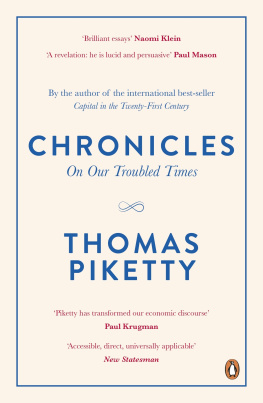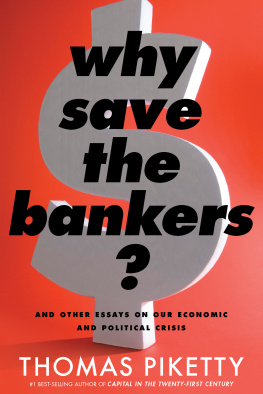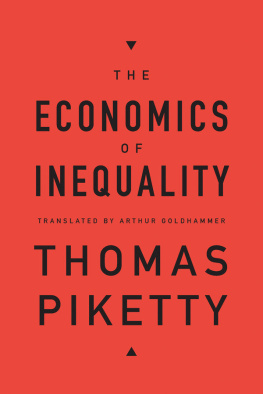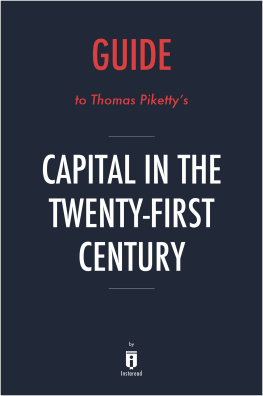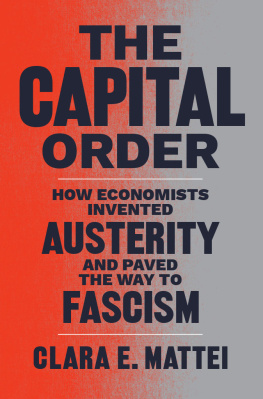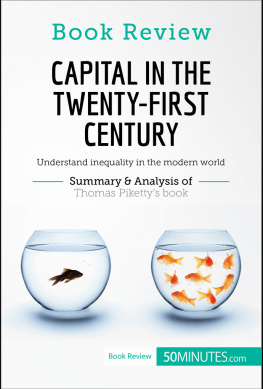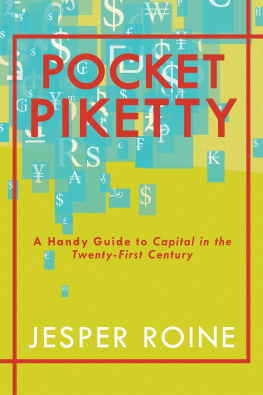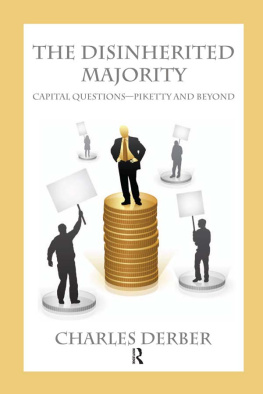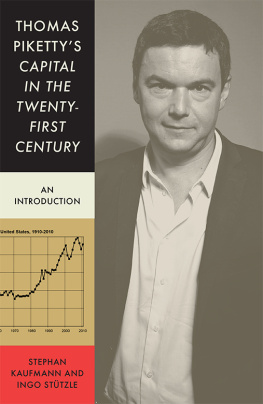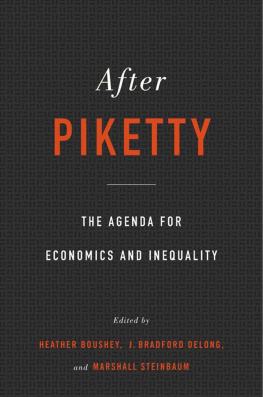Contents
Thomas Piketty
CHRONICLES
On Our Troubled Times
Translated from the French and annotated by Seth Ackerman
VIKING
UK | USA | Canada | Ireland | Australia
India | New Zealand | South Africa
Viking is part of the Penguin Random House group of companies whose addresses can be found at global.penguinrandomhouse.com.
This collection first published in the United States of America by Houghton Mifflin Harcourt as Why Save the Bankers? 2016
First published in Great Britain by Viking as Chronicles 2016
Portions of this book were previously published in Peut-on sauver lEurope? and will be published in Chroniques 20122016
Copyright ditions Les Liens qui Librent, 2012, 2016
Translation and annotation copyright Seth Ackerman, 2016
The moral right of the copyright holders has been asserted
ISBN: 978-0-241-97446-9
THE BEGINNING
Let the conversation begin...
Follow the Penguin Twitter.com@penguinUKbooks
Keep up-to-date with all our stories YouTube.com/penguinbooks
Pin Penguin Books to your Pinterest
Like Penguin Books on Facebook.com/penguinbooks
Listen to Penguin at SoundCloud.com/penguin-books
Find out more about the author and
discover more stories like this at Penguin.co.uk
CHRONICLES
Thomas Piketty is Professor of Economics at the Paris School of Economics and Centennial Professor at the LSE. His book Capital in the Twenty-First Century, which argued that when the rate of return on capital exceeds the rate of economic growth, the resulting unequal distribution of wealth causes instability, has global sales so far of more than 1.5 million copies. It won the Financial Times and McKinsey Business Book of the Year Award and was the biggest-selling management, business or economics book of 2014.
Translators Note
I have translated these essays as they originally appeared in the pages of the French newspapers Libration and, in one case, Le Monde. Since they often refer to people and events that would have been familiar to a French newspaper reader, but not necessarily to readers of this book, I have added explanatory notes, situating them in the context of their time, and defining some French references.
Because many of these essays discuss the Eurozone crisis and assume a working knowledge of the functioning of the European Union, it may be useful to sketch a few relevant facts. The EUs executive branch is composed of two decision-making bodies. The European Council, or Council of Heads of State, brings together national leaders at regular closed-door summits focused on setting broad policy priorities and resolving high-level disagreements. The Council of the European Union is made up of national ministers who meet regularly to set policy in specific areas. Those bodies work together with the appointed European Commission, an elite executive institution that administers policy and proposes legislation, often on the urging of the European Council. Legislation generally must be approved by both the European Council and the directly elected European Parliament. The EUs ensemble of institutions also includes judicial and monetary authorities: the European Court of Justice and the European Central Bank, or ECB.
During the period in which these essays were written, Croatias integration into the EU brought the total number of member states to twenty-eight. When the first articles in this book were published, seventeen of those states shared the euro as their common currency; at the time of this writing, that number stood at nineteen. This group of EU states, collectively called the Eurozone, is expected to expand further provided the euro survives.
Preface
This book brings together many of my published monthly newspaper columns, with no subsequent updating or revision. Some of these pieces have aged a bit, others less so. Taken together, they represent one social scientists effort to understand and analyze the day-to-day world, to get involved in the public debate; an attempt to reconcile the rigors and responsibilities of scholarship with those of citizenship.
The years during which these columns were written were deeply marked by the world financial crisis that began in 20078 and is still ongoing. On several occasions, I tried to understand the new role of central banks as they sought to avert a collapse of the world economy, or to analyze the similarities and differences between the Irish and Greek crises. Not to mention traditional domestic topics, still vital for our common future. But toward the end of the period, one question began to eclipse all the others: Will the European Union be able to live up to the hopes that so many of us have placed in it? Will Europe manage to become the continental power, and the space for democratic sovereignty, that well need in order to take control of a globalized capitalism gone mad? Or will it once again be no more than a technocratic instrument of deregulation, intensified competition, and the subjection of governments to the markets?
At first glance, the financial crisis that began in the summer of 2007 with the collapse of the U.S. subprime mortgage market and the September 2008 bankruptcy of Lehman Brothers can be seen as the first crisis of twenty-first-century globalized patrimonial capitalism.
Lets review. Starting in the 1980s, a new wave of financial deregulation and an outsized faith in self-regulating markets descended on the world. The memory of the Great Depression of the 1930s and the cataclysms that followed had faded. The stagflation of the 1970s (a mixture of economic stagnation and inflation) had showed the limits of the Keynesian consensus of the 1950s and 60s, hastily constructed in the specific context of the postwar decades. The deregulation movement began in 197980 in the United States and United Kingdom, where there was rising unease as the economies of Japan, Germany, and France caught up with and, in the British case, surpassed their own. Riding the wave of discontent, Ronald Reagan and Margaret Thatcher explained that government was the problem, not the solution. They called for escaping a welfare state that had made entrepreneurs soft, a return to the pure capitalism of the pre-World War I era. The process accelerated and then spread to continental Europe after 199091. The fall of the Soviet Union left capitalism without a rival, and a new era began in which many chose to believe in an end of history and a new economy based on permanent stock market euphoria.
It can be seen, incidentally, that wealth owners current prosperity isnt simply due to deregulation. Its also, and chiefly, a long-term catch-up phenomenon after the violent shocks of the early twentieth century, as well as a phenomenon linked to the slow growth of recent decades, which automatically leads to extremely high wealth-to-income ratios. The enduring fact is that we live in an era when wealth in the rich countries does very well, while production and incomes grow slowly. During the postwar decades, we mistakenly believed wed moved on to a new stage of capitalism, a sort of capitalism without capital. In reality, it was only a passing phase, reflecting an era of capitalist reconstruction. In the long run, patrimonial capitalism is the only kind that can exist.

